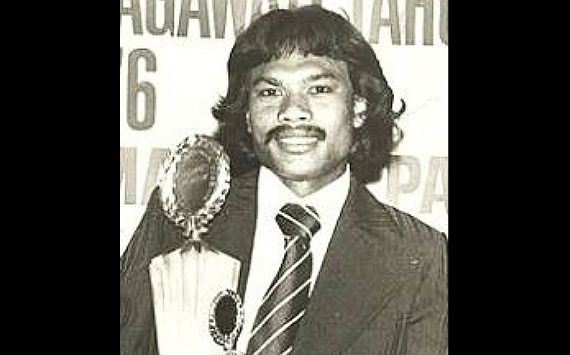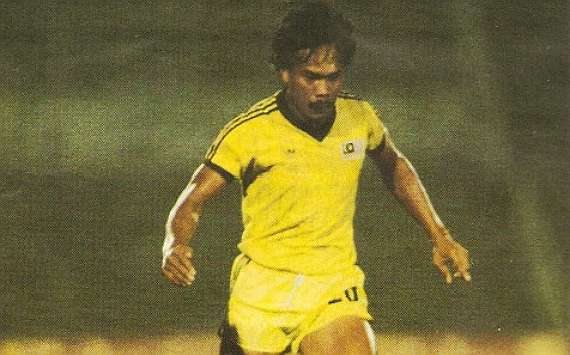This is a story of perhaps the greatest son of Selangor. He was not a politician, nor was he a pop star. He was a footballer. Although footballers nowadays, even Malaysian ones, receive constant adoration and are paid hefty sums of money, he was a footballer at a time when footballers had to keep a day job just to live comfortably. But that was enough for him. Whereas politicians constantly divide the people’s loyalty and pop singers demand fans’ adoration for their own selves, he only united his fans under two flags; those of his birth state Selangor and his country, Malaysia.
| CAREER HIGHLIGHTS | |
 | |
| MOKHTAR DAHARI'S DEFINING MOMENTS | |
| SELANGOR DEBUT APPEARANCES (SELANGOR) GOALS SCORED (SELANGOR) LAST GAME FOR SELANGOR MALAYSIA CUP TROPHIES MALAYSIA DEBUT APPEARANCES (MALAYSIA) GOALS SCORED (MALAYSIA) LAST GAME FOR MALAYSIA NATIONAL SPORTSMAN AWARD | 1971 375 177 1987 10 1972 167 125 1985 1976 |
Mokhtar bin Dahari was born on 13 November 1953 in Setapak, Selangor, and from an early age he showed his aptitude for sports. He would play various sports with his neighbourhood friends such as badminton, but in the end he would gravitate towards the beautiful game; football. Attending the prestigious secondary school Victoria Institution also brought him closer to playing football at a higher level, and spurred on his obsession for football. At the age of 18 he would play for the Selangor youth team in the Burnley Youth Cup that was held in Sarawak.
His contribution and talent for the youth team did not go unnoticed, and not long afterwards he was picked for the Selangor senior team. However, while the norm now is for footballers to be showered with bonuses and monthly remunerations, Mokhtar Dahari and his contemporaries were part time footballers. Before turning up for training every evening, earlier in the day he was simply a bank clerk who had to answer to his superiors and deal with difficult customers just like everyone else at the office. Mokhtar and his teammates would receive small sums of money in the form of training and match allowances, and win bonuses, but nothing in the way of lucrative contracts that are so common in modern-day football. He lived a modest life, commuting from his office to the training ground on a humble underbone motorcycle. When it was stolen one day, he was so devastated that he rather rashly decided to quit football. Luckily, the intervention of a motorcycle manufacturing company, which provided him with a new motorcycle, reversed the young star’s decision and he soon turned up for training again on his shiny new motorcycle. He would then return his generous sponsor’s favour, although perhaps not directly. In 1972, he would end up scoring nine goals in the prestigious Malaysia Cup for his home state team, and 10 goals for the national team, a remarkable achievement for such a green player.
The year 1974 was even more successful for ‘Supermokh’, as he began to be known to the fans. He helped the Malayan Tigers to an Asian Games bronze medal, scoring 24 times for them throughout the year, and he scored an unbelievable 19 goals for Selangor in that year’s Malaysia Cup alone. He was on the ascendancy, the first ever footballer to truly capture the imagination and hearts of supporters throughout the country.
Part of his prowess stemmed from his physique. He was not immensely big, but he was muscular, as Number 10's back then normally were, and the strength of his calves and thighs gave him the ability to rocket his shots towards the goalmouth. But he was not simply strong, Mokhtar had the technique to complement his strength, and he was famous for his long solo runs up the field that would be finished off with a sizzling driver of a shot. He made his mark terrorising defenders throughout the country.
In the following years, he would feature in a number of memorable matches, and win several competitions for the national team. In 1974, he would help Malaysia to a silver medal in the Asian Games in Tehran. In 1975, his brace would see Malaysia edge out the English club Arsenal 2-0 in a friendly match, whereas a friendly against the England ‘B’ side in 1978 would end in a draw. These two high-profile matches would see Mokhtar being linked with English clubs, but nothing concrete would emerge out of this apart from mere rumours. At the regional level, he would help Malaysia capture back-to-back gold medals at the SEA Games in 1977 and 1979.
On the personal front, he found a life partner in Tengku Zarina Tengku Ibrahim from Kelantan, whom Mokhtar first met while playing against a local team in her hometown. They would eventually be married in 1979 after being friends for over seven years. She would be Mokthar’s biggest fan, and at times she would even find herself confronting fans who derided her husband excessively.

Mokhtar is the all time top scorer for both Selangor and Malaysia
However, there is a reason why Mokhtar Dahari’s status transcends that of just a superstar to make him a legend of Malaysian football. His talents and footballing abilities were backed up by heart, and in his heart, he only played for his fans and his state; Selangor. He even refused to be warded after coming down with a high fever the evening before one important match, not wanting to miss it. In an interview with the National Geographic Channel, Tengku recalled the extent of his passion, and that his husband never did it for money, saying “I live and die for Selangor”.
In fact, he showcased his dogged loyalty by helping Selangor to 10 Malaysia Cups in 14 editions of the annual competition, playing his last game in the famous red and yellow kit in their 6-1 drubbing of Johor in the 1986 final to emerge champions once more. In the post-match celebration, he gifted his jersey and revealed his intention to the Sultan of Selangor; Sharafuddin Idris Shah which would only sink in with the ruler a few days after that, buried amidst all the jubilation and euphoria.
After his playing days were over, Mokhtar took up coaching duties. But trouble soon emerged when he started collapsing on the pitch, something that was almost unthinkable for someone of his age and reputation. His wife took him to London for a more thorough check up, and he was diagnosed with the motor neuron disease, a fatal degenerative affliction that hinders a person’s ability to control all the bodily muscles, which also manifests more quickly in those actively involved in athletics. Despite all the efforts undertaken by his family, Mokhtar passed away on 11th July 1991 at the age of only 37, leaving behind his wife and three children, and a legacy that has never been surpassed by any other Malaysian footballers since. Such is the life of all heroes and legends. They burn the brightest, but they also burn out the quickest, leaving behind only stories, half-buried amidst lores and myths.
Even up to this day, even Malaysians who have never seen him play will talk about him as if they have. He lives still in the stadium, to the Selangor and Malaysia fans who are still waiting for a successor who is worthy to be compared with Mokhtar. His face is emblazoned on fans’ banners and posters, and in that way, a local hero who gave his all for his state before his untimely death, never truly died.
